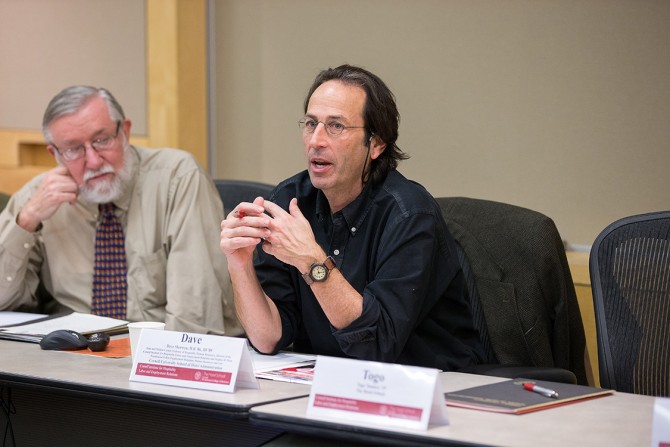New center improves employment relations in hospitality
By Mary Catt
The ILR School and the School of Hotel Administration have strengthened their partnership by establishing the Cornell Center for Innovative Hospitality Labor and Employment Relations, an equally shared initiative of the schools.
The center, formerly an institute, provides a collaborative space for employers, unions, government representatives and employee advocate organizations – who are sometimes would-be adversaries – to talk with academics about how they can work together to modernize labor relations in the hospitality industry for the benefit of all.
“Being a center means the ILR School is now an official and equal partner,” said David Sherwyn ’86, J.D. ’89, the John and Melissa Ceriale Professor of Hospitality Human Resources and director of the center. Previously, the Hotel School was responsible for overall operation of the center, formerly the Institute for Hospitality Labor and Employment Relations.
“The goal has always been to improve employment relations in the hospitality industry. Having ILR as a partner and establishing an employee advocate board is a major step in achieving that goal,” Sherwyn said. “It’s great we’re more formally connected. The relationship has deepened and solidified. We’ve gone from being cousins to being siblings.”
The goal of the institution remains the same, Sherwyn said. “It provides a place for management and employees to get together to help achieve mutual goals.”
At the center, experts and practitioners discuss issues such as mandatory arbitration, technology trends, tipping, sexual harassment, the proliferation of state employment laws, wages and benefits, according to Richard Hurd, associate director of the institute and a professor emeritus of ILR labor studies.
Said Sherwyn: “We are not going to solve every issue, but we can make it better. This business moves really fast and can impact millions.”
Scholarly research and educating students are also priorities of the center, he said. Through the class Labor Relations in the Hospitality Industry, taught by Hurd and Sherwyn, students participate in simulated union organizing campaigns and contract negotiations. Guest speakers from management and unions share industry developments. Students also have the opportunity to observe real arbitrations. Every year, more than 10 students from the labor relations course can attend the center’s annual HR in Hospitality Conference and Expo.
The center helps students see the industry in a holistic way and opens doors for them to learn from prominent industry leaders, Sherwyn said. “Nowhere else are they getting that.”
Center events also include industry roundtables in major cities around the country, from San Francisco to Chicago and Washington, D.C.
“There are times when management or employee advocates want to meet in a private setting with just ‘their side’ to discuss strategy or just to learn in a safe space,” Sherwyn said. “There are other times, however, when management and employee advocates can sit at the table together and learn from each other. The center provides both of these forums through its roundtables. Cornell is the only place where these types of meetings occur.”
New this year is an employee advocate roundtable for employment and labor lawyers, worker rights organizations, unions and plaintiff lawyers who advocate for class action participants.
Harry Katz, director of the Scheinman Institute of Conflict Resolution, said, “Adding an employee advocate roundtable make sense because of the fact that employee rights disputes, including sexual harassment allegations, have grown enormously over the last 20 years and many of those disputes are resolved via employment arbitration.”
Mary Catt is assistant director of communications at the ILR School.
Media Contact
Get Cornell news delivered right to your inbox.
Subscribe

